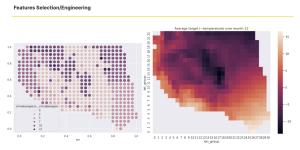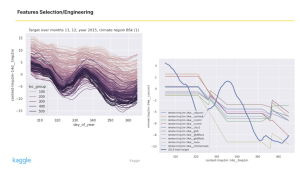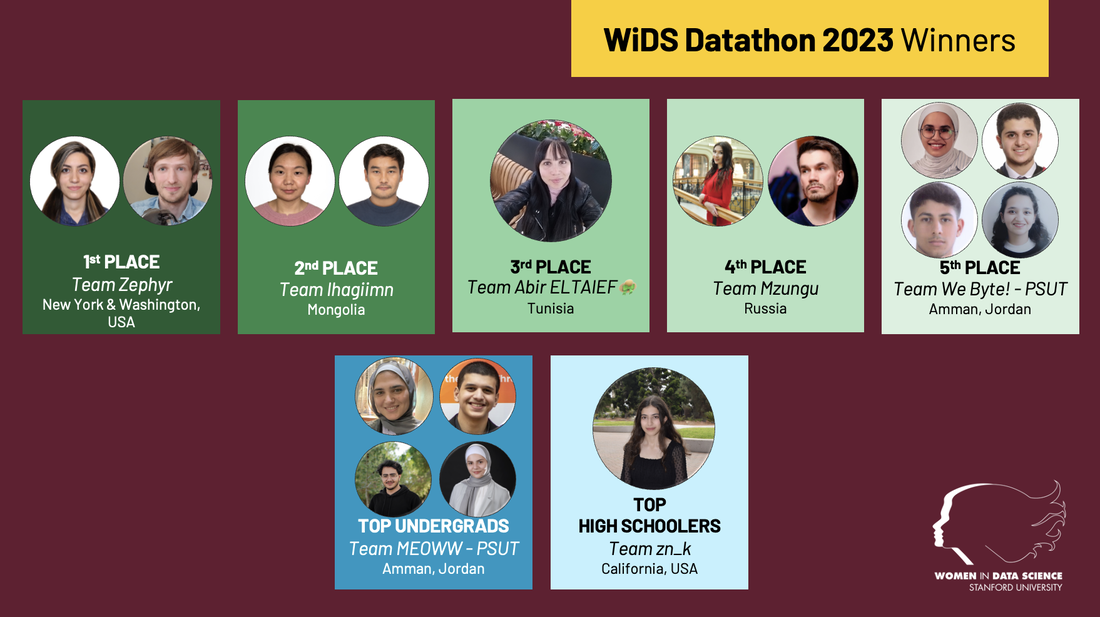After the WiDS Datathon 2023 competition closed, WiDS Datathon committee member Maggie Demkin of Kaggle and the WiDS Datathon core team arranged for a series of calls with some of the winning teams to learn more about their experiences and approaches to the competition. For many of the winners, this was their first Kaggle competition. During these interviews winners spotlighted the importance of teamwork, getting started in a machine learning competition, and being open to new knowledge and findings shared through both WiDS Datathon and Kaggle resources.
Recordings of these conversations and solutions shared on Kaggle are now available so that everyone can learn from the winners.
Top High School Team: Zeyneb Kaya
Zeyneb Kaya is a Junior at Saratoga High School in California and a WiDS ambassador. This was her second year participating in the WiDS Datathon. She learned a lot during this year’s competition and said it was a fun experience. Zeyneb described her methodologies including “Climate Region Experts” and “Iterative Pseudolabeling”.
She made two interesting observations:
- From climate region, observe a very peculiar pattern in the climate regions—very similar to that in mid+west US
- Scale lat + lon between this area and plot true climate regions
Zeyneb arrived at a distribution map that was very close to the actual distribution:


Zeyneb says, “it’s not just some code on a computer – you’re applying it to a real-life problem”. The interdisciplinary nature of the challenge excited her. This motivated her to transition from looking at computer science as code, to a problem solving tool, to eventually addressing real problems in a computational way. She was eager to do a lot of exploring before building a model. Zeyneb says, “I want to look at whatever problems I’m trying to solve-and apply based on that.”
Zeyneb shared how her data science journey has been impacted through her connection with many different girls and women who are determined to learn and grow with her.
1st place: Team Zephyr | Evgeny Demekhin and Elham Amini
Evgeny Demekhin and Elham Amini met this year on the WiDS Datathon Kaggle discussion board where they decided to form a team and compete in the competition. They did not know each other prior to the datathon. Elham is a Data Scientist at IBM. Evgeny is a researcher at Teza Technologies where he works in finance.
They built a very simple model with Lasso Regression as well as a combination of Catboost, XGBoost and LGBM for the Residuals. All of their models were time series. You can find their results posted on the Kaggle discussion board.
What were their biggest takeaways? For Elham, it was a great opportunity to practice her data science skills. She applied theoretical knowledge learned in a recent course to solving this year’s challenge. She also enjoyed being creative. For Evgeny, he said that teamwork is valuable in this kind of competition. They motivated each other and collaborated together to come up with great ideas.
5th place: Team We Byte! – PSUT | Mohammad Doleh, Issa AlBawwab, Dana Al Sharif, Layan Hammad
Team We Byte from Princess Sumaya University for Technology in Amman, Jordan collaborated together on the WiDS Datathon 2023 challenge. Mohammad Doleh, Issa AlBawwab, Dana Al Sharif and Layan Hammad are all second year university students studying data science. They met through their university courses. This was their first Kaggle competition, as well as their first experience with machine learning–typically a subject taught as a third year course at PSUT.
To solve this year’s challenge they used different training methods including Ridge Regression, CatBoost and LightGBM (and used CatBoost twice.) They used 4 models (all time series), combining the 2 Catboost models with lag and rolling features. Through trial and error they found that Elevation and Precipitation were important features. They utilized datathon resource notebooks shared on Google Colab, Kaggle and Jupyter.
While the team had no prior experience to complete such a challenge, they were motivated by collaboration, teamwork, and encouragement from their teachers to learn and grow together. They divided the tasks amongst the four team members and met every day at 10am to discuss progress, share research, and engage in public discussions in chat rooms that helped them understand the climate change problem they were trying to solve. Through this they were able to educate themselves on machine learning parameters, and apply these parameters to their code.
What were their biggest takeaways? Mohammad enjoyed learning from the start through discussion and others’ code. Dana agreed and added, “I have never made a model before. I have never done anything like this before, or have worked with machine learning. This was my first competition ever. Working with the team really helped because I didn’t think I would have done this on my own.” Layan said that in addition to working with a really good team, her biggest takeaway was dealing with geography and machine learning together. Issa says, “It was hard, especially the first couple of weeks–it was like firing through fog. We were going in blind. We had no sense of direction. As beginners, we were trying everything. But slowly we started learning. We started asking people. We started finishing the courses we started on Kaggle… You can learn anything if you put in the hard work and you ask for people who are curious about the topic.”
Results shared from all WiDS Datathon winners:
- 1st place: Team Zephyr | Evgeny Demekhin and Elham Amini
Results posted on Kaggle - 2nd place: Team Ihagiimn | Lkhagvadorj Munkhdalai and Angarmaa Dorjderem
Results posted on Kaggle - 3rd place: Abir Eltaief
Results posted on Kaggle - 4th place: Team Mzungu | Nikolai Nazarov and Yulduz Fattakhova
Results posted on Kaggle - 5th place: Team We Byte! – PSUT | Mohammad Doleh, Issa AlBawwab, Dana Al Sharif, Layan Hammad
Results - Top High School Team: Zeyneb Kaya
Results - Top Undergraduate Team: Team Meoww – PSUT | Dareen Jaser | Qusay Abdo | Omar Attawneh | Manar Abutair
Results posted on Kaggle | Code | Submission Model
In summary, datathon winners from this year’s competition express to those starting out in data science, “If you put your mind to something, you can achieve it. Just take the first step”.


